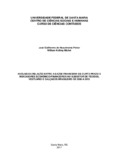| dc.contributor.advisor | Pigatto, Jose Alexandre Magrini | |
| dc.creator | Petter, José Guilherme do Nascimento | |
| dc.creator | Michel, William Kelling | |
| dc.date.accessioned | 2019-09-18T16:36:03Z | |
| dc.date.available | 2019-09-18T16:36:03Z | |
| dc.date.issued | 2017-06-27 | |
| dc.date.submitted | 2017-06-27 | |
| dc.identifier.uri | http://repositorio.ufsm.br/handle/1/18258 | |
| dc.description.abstract | In order to be successful in their operations, investors use various methodologies to substantiate their opinion about the companies' financial health in order to reflect adequate security in their investments. Among these methodologies, the dynamic analysis of working capital proposed by the Fleuriet model is highlighted, as well as the analysis of economic and financial indicators through the quotients of the items in the financial statements. Based on these methodologies, the present research comes from the problematic given by the search for the existence of an association between the economic-financial indicators and the short-term financial health, with the purpose of verifying the ability of the classic balance sheet analysis indicators to explain the short-term financial situation proposed by the Fleuriet model in the brazilian textile, clothing and footwear subsector companies listed on BM&FBOVESPA during the years 2008 to 2015. This is a descriptive research, technically classified as documentary and bibliographical, with quantitative data analysis. Spearman's correlation coefficient was used as a statistical tool for the establishment of associations between variables. It was verified that all the economic-financial indicators utilized by the research have a positive relation with the short-term financial health, except for those of equity structure, where the index of relation between third-party capital and total liabilities showed a negative association, and the debt composition index did not present a significant correlation. | eng |
| dc.language | por | por |
| dc.rights | Acesso Aberto | por |
| dc.subject | Financial health | eng |
| dc.subject | Fleuriet model | eng |
| dc.subject | Economic-financial indicators | eng |
| dc.subject | Textile, clothing and footwear subsector | eng |
| dc.subject | Spearman's correlation coefficient | eng |
| dc.subject | Saúde financeira | por |
| dc.subject | Modelo Fleuriet | por |
| dc.subject | Indicadores econômico-financeiros | por |
| dc.subject | Subsetor de tecidos, vestuário e calçados | por |
| dc.subject | Coeficiente de correlação de Spearman | por |
| dc.title | Análise da relação entre a saúde financeira de curto prazo e indicadores econômico-financeiros no subsetor de tecidos, vestuário e calçados brasileiro de 2008 a 2015 | por |
| dc.title.alternative | Analysis of the relation between short-term financial health and economic-financial indicators in the brazilian textile, clothing and footwear subsector from 2008 to 2015 | eng |
| dc.type | Trabalho de Conclusão de Curso de Graduação | por |
| dc.degree.local | Santa Maria, RS, Brasil | por |
| dc.degree.graduation | CIÊNCIAS CONTÁBEIS | por |
| dc.description.resumo | A fim de obter êxito em suas operações, os investidores fazem uso de diversas metodologias para fundamentar sua opinião acerca da saúde financeira das companhias, de modo a refletir certa segurança em seus investimentos. Entre essas metodologias, destacam-se a análise dinâmica do capital de giro proposta pelo modelo Fleuriet, bem como a análise de indicadores econômico-financeiros através de quocientes dos itens das demonstrações contábeis. Com base nessas metodologias, a presente pesquisa provém da problemática dada pela busca da existência de associação entre os indicadores econômico-financeiros e a saúde financeira de curto prazo, com isto objetivou verificar a capacidade de explicação da situação financeira de curto prazo proposta pelo modelo Fleuriet por parte dos indicadores clássicos da análise de balanços nas empresas brasileiras do subsetor de tecidos, vestuário e calçados, listadas na BM&FBOVESPA durante os anos de 2008 à 2015. Trata-se de uma pesquisa descritiva, tecnicamente classificada como documental e bibliográfica, com análise de dados quantitativa. Foi utilizado o coeficiente de correlação de Spearman como ferramenta estatística para o estabelecimento das associações entre as variáveis. Constatou-se que todos os indicadores econômico-financeiros abordados pela pesquisa possuem relação positiva com a saúde financeira de curto prazo, com exceção dos de estrutura patrimonial, onde o índice de relação entre capital de terceiros e passivo total mostrou associação negativa, sendo que o índice de composição do endividamento não apresentou correlação significativa. | por |
| dc.publisher.country | Brasil | por |
| dc.publisher.initials | UFSM | por |
| dc.subject.cnpq | CNPQ::CIENCIAS SOCIAIS APLICADAS::ADMINISTRACAO::CIENCIAS CONTABEIS | por |
| dc.publisher.unidade | Centro de Ciências Sociais e Humanas | por |


